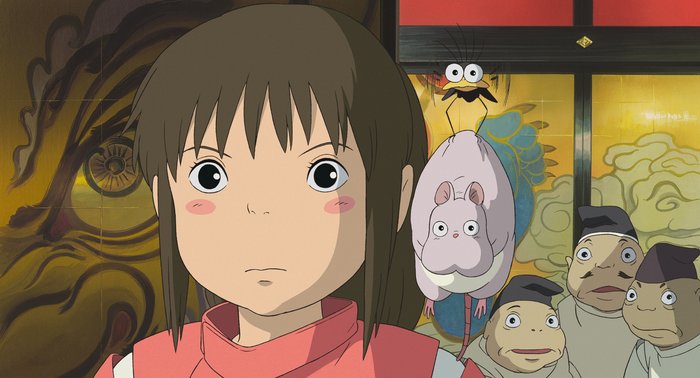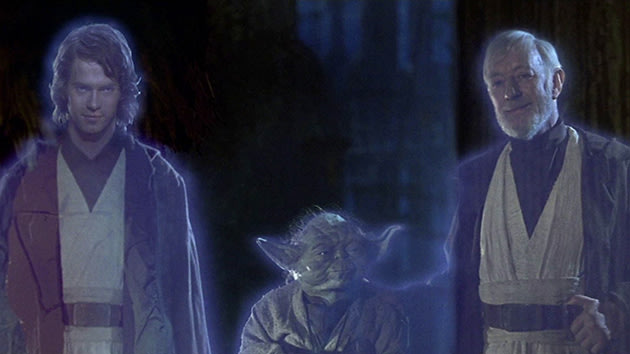And a lot of things don't make sense... initially. But then you realise that things do makes sense, it's just that the logic of the spirit world is quite a bit different from the logic of the human world with a different set of rules. But there is a logic with set of rules that govern it.
 |
| Like the universal constant that you will be uncomfortably cramped in an elevator at some point. |
And the logic of the spirit world is bound in language. Or rather who has control of language. In Spirited Away, the spirits are bound to their word and have to adhere to the oaths they make and the contracts they sign, as in they literally cannot break their word. Language, and who has mastery of language (which is how they cast their spells and do magicky stuff) is what governs the spirit world.
Which actually reflects the real world more than most people realise, since our world is shaped by language. Literally. Our whole perception of the world is mediated by language, by words. Words have power because they can be used to shape our perception of reality. In fact, they are powerful because they are reality. Or rather, to be precise, they construct it.
Since everything has a word for it and given a name, something to define it so it fits within our perception of reality. We are bound in language from birth (we are all given names that identify us), defined by it and use it to filter our perception of reality.
 |
| "Who say what where now?" |
Which is why people who speak a different language to our own often seem to have a different way of viewing the world. Part of the reason behind this is not only because their words are different and things get lost in translation, but because we think in our native language, or if you're particularly interesting, in a second language as well.
Therefore, their thought processes would follow the logic of that language. A language with different grammar that structures those words differently. A different way of mediating and constructing reality.
Of course there are a myriad of other important factors like culture, socio-economic considerations, and so on, all of which play a part. But all of that is filtered through language. Language is the primary medium through which we interact with the world. And by using language in certain ways we often shape our perception of reality.
I'm not going to go into any more depth about how the way language is a medium that filters our perception of reality since I've already gone way too Media Studies 100. Rather, this is just background stuff for what I want to say about Spirited Away. Because this is what is being tapped on in Spirited Away, the power of language to control reality.
For example, Yubaba, the witch who runs the bathhouse, uses her witchy control of language to dominate Chihiro. She talks all over Chihiro when they first meet, dismissing her words with a flick of the wrist which literally zips her mouth, limiting Chihiro's ability talk and assert herself.
| Sort of like this. Remember how Agent Smith takes away Neo's ability to protest by cracking a wisecrack about what good would a phone-call be if he can't talk? Ah, good times. |
And remember how I mentioned above how we are all given names? (It's in brackets if you can't find it.) Well, after signing her contract with Yubaba, Chihiro's name gets taken away from her as Yubaba absorbs characters from her name and gives her the new name of Sen. And when I say absorb the characters from her name, she totally hoovers them up, sucking them into her hand.
Similarly, Haku, the devilishly dashing boy who helps out our klutz of a heroine, has had his name taking away from him as well. Which results in him not knowing who he is anymore and transforms him into a badass white dragon of awesometude whenever he is sent on errands for Yubaba. Some people might see that as good deal on his part. Because I'm not joking about how amazetastic he is in his dragon form.
| No caption is worthy of the coolness of this picture. |
And all this stuff about stealing people's names ties into the pretty widespread notion across various cultures that we are defined by our names and that by knowing one's true name, we can gain some sort of power over them.
Think about all the demonically possessed girl movies over the years or you know, any episode of Supernatural where they banished a demon. The exorcist always tries to learn the name of the demon doing all the possessing, since knowing its name will give them the power to exorcise them with minimum effort and less crucifixion masturbation.
All beings in the spirit world are bound by language, even those who seem to be in control of it and all magicky-powerful, like Yubaba. Yubaba is the most powerful being we see in the movie, aside from her twin sister, Zeniba. Yet she too is unable to break the binds of language. She gives Chihiro a job at the bathhouse not because she wants to or thinks that Chihiro will be a valuable employee despite the fact she is a ginormous klutz, but because she has to since she made an oath to give work to anyone who asks for it and is bound to keep her word.
Language and spells are intrinsically linked in the spirit world, in the sense that spells are used to limit access to language. In so doing, language or the lack of access to it, is used to bind and control the person who is under the spell, taking away their ability to talk or remember who they are, often transforming them in the process.
Like when Boh and that harpy bird thing are turned into a mouse and a little bug-eyed bird thing respectfully.
 |
| "What the hell is that bug-eyed bird thing?! Is... is it carrying a mouse?" - Dudes in the background. |
Boh can no longer talk after he's turned into a mouse because mice can't talk since that would be silly. You're silly. Thinking that mice can talk. Silly.
But because the spell stripped him of his ability to access language, it took away his agency or ability to assert his own identity. Which is why his mother, Yubaba, doesn't recognise him in his mouse form. He can no longer talk so his identity has been taken away from him (and actually given to those disembodied heads who have been magicked to look like him). Also, he's a mouse.
And there are a number of creatures and spirits that can't talk or have no voice of their own that come to the bathhouse. Like the Stink God who actually isn't a Stink God but a river spirit that has been turned into a lovable sludge monster of oozing fecal matter which burns your nostrils with his striking fragrance because his river has become seriously polluted (Environmental message: polluting is bad, don't do it kids).
 |
| His distinctive aroma is sure to set your senses alight, curl your nose, and put your hair on end... He smells bad is what I'm saying. |
Now, when he's being confused for a god (stink or no, they still think he's a god which is pretty sweet), the river spirit can't speak. He can't articulate what his problem is aside from looking unhappy with his sad fecal sludge face.
It's only after Chihiro/Sen discovers the bike handle sticking out from the then Stink God (May his stench ever be praised!) and they remove all the garbage that's blocking up his spiritiness that he regains his proper form and can speak again- congratulating Sen on a job well done. He then drops gold as he bounces out of the bathhouse because that's how river spirits do.
| "River Spirit out, bitches." |
But the character who highlights the most how crippling it is not being able to speak in the spirit world is No Face. No Face is the silent masked spirit that Sen accidentally lets inside the bathhouse. He doesn't really have much of a shape, physically more like a black shadow with a mask at most times, only occasionally forming thin little arms for doing arm things.
And his inability to speak is tied to lack of form, because it is only after he eats frog dude and steals his amphibian voice that he grows legs in addition to arms and his body takes on some sort of form.
But his muteness is formless like a void, which is a great metaphor for me to come up with because he has a void inside him. Boom, metaphor. A void of loneliness and a need to filled that void with attention and food, lots and lots of food.
Which is why he wakes everyone up in the middle of the night and throws gold about for everyone, because he wants people to give him food and attention. He is just lonely, so very, very lonely.
 |
| "Will you be my friend?" |
His desperate attempts to make a connection with Sen through emphatic grunts and bribery with handfuls of bath tags or gold is the only way he can get past his debilitating solitude, trying to befriend the only person who acknowledged him when he was silent and all formless and stuff.
So, yeah, language is, like, important and stuff in Spirited Away, reflecting the importance of words in the real world, since language, not friendship, is magic. It allows us to express our identity and assert ourselves with our words, it gives us power over things by defining them, and mediates our very perception of reality.
And all perceptions of reality should have a Haku dragon. So, work on using language to perceive a Haku dragon because holy shitballs, why wouldn't you?
References:
Spirited Away Wikipedia page
Hayao Miyazaki Wikipedia page
Studio Ghibli Wikipedia page










